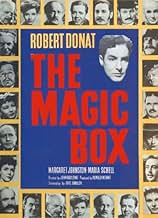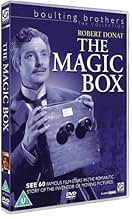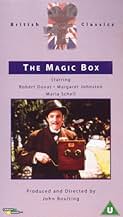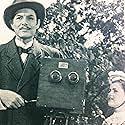IMDb रेटिंग
7.0/10
1.5 हज़ार
आपकी रेटिंग
अपनी भाषा में प्लॉट जोड़ेंA chronicle of the life of William Friese-Greene, a British inventor and early pioneer in cinema.A chronicle of the life of William Friese-Greene, a British inventor and early pioneer in cinema.A chronicle of the life of William Friese-Greene, a British inventor and early pioneer in cinema.
- 2 BAFTA अवार्ड के लिए नामांकित
- 1 जीत और कुल 2 नामांकन
Renée Asherson
- Miss Tagg
- (as Renee Asherson)
फ़ीचर्ड समीक्षाएं
The most enjoyable and very emotional scene was when Robert Donat (Wm. Friese-Greene) finally succeeds in producing moving images on a sheet he's hung in his studio...he runs like a madman into the street in the middle of the night desperate to find someone to witness this miracle. Who does he find? Sir Laurence Olivier..a Police Constable . Donat ushers him into his lab, sits him down and proceeds to ramble on about what he's invented. Sir Laurence, the ever vigilant and cautious policeman thinks he's some kind of nut and slowly reaches for his night stick..that's when Robert Donat flicks on the first moving pictures of Hyde Park...Olivier is flabergasted..gets up moves to the sheet and looks behind it.."That's Hyde Park!' After rambling some more Robert Donat breaks into tears..finally explaining what he has accomplished..Olivier replies "You must be a very happy man"..a terrific scene and one I'll never forget. A cameo appearance by Lord Olivier and a very memorable scene.
A stunning biography of William Friese-Greene, the UK inventor who made important contributions towards the creation of the motion picture, then saw greatness pass him by. Brilliantly written by Eric Ambler, and with beautiful color photog by Jack Cardiff (working in the 3-strip Technicolor process that we see Friese-Greene working towards in the picture!). Robert Donat's performance in the lead is among his best screen work. As this was made on the occasion of Britain's 1951 "Festival of Lights", virtually every British actor of note at the time appears in the picture---but pay particularl attention for Laurence Olivier, as a London "bobby" who is the first to see Friese-Greene's "pictures that move", and for the film's closing line, delivered by Dennis Price.
Whether or not William Friese-Greene was actually the father of motion pictures he was certainly in there trying. And though Edison and some French guys get a mention in passing this beautifully-mounted star-laden tribute to dogged endeavour is all Willie's show - made thirty years after his death and timed for the Festival of Britain. It almost missed the bus in this regard and wasn't generally released until the following year,something charmingly British about that. The film itself is charmingly British too, handling its huge cast and period detail with steady quietly-absorbing assurance. Eric Ambler's deftly-crafted script provides romance, comedy, poignancy and an absolutely splendid pinnacle-scene which sums the picture up both in terms of story and production-plan. His dual-flashback structure, which some find confusing, permits the masterly Robert Donat to re-wind from forgotten old codger to eager young whippersnapper and back again with a shift in the middle for 'changing reels' on the assertion of his second wife that "Willie was before my time". This second marriage assuaged his widower-loneliness and certainly produced quite a brood but was blighted by despondency - he's not mentioned in the Encyclopedia - and his ever-present financial incompetence which severs their union. It's the more distant past, the era of inspiration and achievement, which is the film's ultimate destination.
The cameo stars fall to with aplomb - 'The Play's the Thing, what would you like us to do ?' There's the fun of the Living Statues, Margaret Rutherford at her most formidable, wiping the floor with Mr. Guttenberg, Joan Hickson's cute scene-stealing as the customer with the facial twitch, Muir Mathieson appearing on-screen for once conducting the Bath Choral Society while the only solo male vocalist is miles away chinwagging forgetfully with the inventor of photography. Eric Portman bulldozes through as Willie's irascible business-partner and almost every trade and profession is represented along the way by a famous face - doctors, reporters, bank managers, estate agents, instrument-makers, pawnbrokers and company promoters - this last attributed in the credits to Roland Culver and Garry Marsh who do not appear in the release-prints. The BFI site solves the vexing question of the truncated version short by fifteen minutes which is now apparently the only one that survives. The most illustrious guest is fittingly the last to make an entrance - Olivier as the apprehensive bobby on the beat dragged in off the street by Willie to watch Hyde Park shimmering on a sheet. One of the great scenes in British cinema its magical blend of narrative-significance and emotional realism is in effect the movie's climax. The quibbling over technical inaccuracies here is irrelevant, it's not a documentary and as long as the audience gets the point the purpose is served. Maria Schell is enchanting as the first Mrs. Willie and Jack Cardiff - the Technicolor Kid - would have made our hero proud. It's the visionary labour of Willie and his contemporaries which has given us what we love. To correct another poster the last ironic line in the film after Willie's demise is spoken not by Dennis Price but by Michael Denison.
The cameo stars fall to with aplomb - 'The Play's the Thing, what would you like us to do ?' There's the fun of the Living Statues, Margaret Rutherford at her most formidable, wiping the floor with Mr. Guttenberg, Joan Hickson's cute scene-stealing as the customer with the facial twitch, Muir Mathieson appearing on-screen for once conducting the Bath Choral Society while the only solo male vocalist is miles away chinwagging forgetfully with the inventor of photography. Eric Portman bulldozes through as Willie's irascible business-partner and almost every trade and profession is represented along the way by a famous face - doctors, reporters, bank managers, estate agents, instrument-makers, pawnbrokers and company promoters - this last attributed in the credits to Roland Culver and Garry Marsh who do not appear in the release-prints. The BFI site solves the vexing question of the truncated version short by fifteen minutes which is now apparently the only one that survives. The most illustrious guest is fittingly the last to make an entrance - Olivier as the apprehensive bobby on the beat dragged in off the street by Willie to watch Hyde Park shimmering on a sheet. One of the great scenes in British cinema its magical blend of narrative-significance and emotional realism is in effect the movie's climax. The quibbling over technical inaccuracies here is irrelevant, it's not a documentary and as long as the audience gets the point the purpose is served. Maria Schell is enchanting as the first Mrs. Willie and Jack Cardiff - the Technicolor Kid - would have made our hero proud. It's the visionary labour of Willie and his contemporaries which has given us what we love. To correct another poster the last ironic line in the film after Willie's demise is spoken not by Dennis Price but by Michael Denison.
The most notable aspect of this film is the enormous number of famous actors, some of whom I didn't notice but saw them on the cast list. Older viewers will enjoy looking out for them. The acting is therefore generally very good.
I have two main criticisms of the film. First, the story is shown out of sequence, and would have been just as good and less confusing if shown in the correct sequence. Secondly, it is not accurate, being a strange mixture of fact and fiction. For example, at one point he meets William Fox-Talbot, who died when Friese-Green was only 22! If a biographical book made such a claim it would be strongly criticised, but for some reason which I have never understood it is perfectly acceptable in the cinema.
So watch it purely for entertainment., but for biographical facts go to Wiki or elsewhere.
I have two main criticisms of the film. First, the story is shown out of sequence, and would have been just as good and less confusing if shown in the correct sequence. Secondly, it is not accurate, being a strange mixture of fact and fiction. For example, at one point he meets William Fox-Talbot, who died when Friese-Green was only 22! If a biographical book made such a claim it would be strongly criticised, but for some reason which I have never understood it is perfectly acceptable in the cinema.
So watch it purely for entertainment., but for biographical facts go to Wiki or elsewhere.
This biopic of inventor William Friese-Greene was based on Ray Allister's book "Friese-Greene: Close-up of an Inventor". Allister used the recollections of the inventor's family and friends for his biography. Such sources have oft proved unreliable, and this is such a case. Brian Coe and other historians have since debunked some of the myths invented by Friese-Greene and perpetuated by his family, friends and biographers. The mythical result here, in this film, is that Friese-Greene appears as the primary inventor of motion pictures and cinema.
The climax of "The Magic Box" has Friese-Greene projecting his film taken at Hyde Park to a policeman. The film-within-the-film is not the actual photographs taken by Friese-Greene, but the invention of the makers of "The Magic Box". This first film appears in a condition that would rival the Lumière programs of some six years later; the flickers and jitters are unrealistically light. Moreover, it would be the first multi-shot film, preceding by about eight years the earliest such films that I've seen or read of. The first part, which takes place in the park, with a man and his son approaching the camera, is followed by the so-called scene of leisurely pedestrians, open-topped buses and hansom cabs with trotting horses. In this last part, however, which doesn't exist today, appears within "The Magic Box" as a scene of curious observers looking at the likewise observing camera.
Allister, however, has reprinted six frames of the first part of the subjects. Others have surmised that this film was taken at about four or five frames per second. The film within "The Magic Box", however appears to have been photographed at least at 16 frames per second, which is generally acknowledged as the minimum speed for the illusion of motion. Moreover, the Hyde Park film probably wasn't seamlessly projected; the film wasn't even perforated. Two frames each were also photographed at a time, which explains why, as you can see in "The Magic Box", Friese-Greene's camera features two lenses. This was because the film was a stereoscopy attempt; that is, Friese-Greene thought he might be able to produce three-dimensional images by overlapping two simultaneously photographed frames. Allister has also reprinted four frames from another film by Friese-Greene--a street scene taken in Chelsea. This film is perforated, but still appears to have been photographed at probably no more than five frames per second.
On a further historical note, Friese-Greene is said to have given some public demonstrations of films, although he doesn't seem to have been too successful with them. Later, he gave public showings of Birt Acres's films, which seems an indication of his own incomplete work on motion pictures. Additionally, Greene's former business partner Arthur Collings did go on to become one of Britain's earliest filmmakers; he was giving public performances of his films in late 1896.
In short, the movie industry demonstrated itself incapable of rendering even its own history accurately. This isn't necessarily a knock on the quality of "The Magic Box", though. I've come not to expect accurate history lessons from movies (and, sometimes, not even from books). Interestingly, and probably more accurately, Friese-Greene's life is depicted throughout the rest of the film as an indebted and failed inventor, who lost his family and, it would seem, part of his sanity. The flashback storytelling structure is accessible. The fictionalized, climactic moment of success, as a dramatic, self-reflexive scene is quite moving. The film, in general, is absorbing, and the production values are topnotch. Friese-Greene's camera, other pre-cinema trinkets and the originally slow process of taking photographs are well rendered. I also liked the fairground scene where they catch a glimpse of three Lumière films projected within a tent. Its history is inaccurate, but "The Magic Box" is nevertheless an inspired look back at the beginnings of the art form.
The climax of "The Magic Box" has Friese-Greene projecting his film taken at Hyde Park to a policeman. The film-within-the-film is not the actual photographs taken by Friese-Greene, but the invention of the makers of "The Magic Box". This first film appears in a condition that would rival the Lumière programs of some six years later; the flickers and jitters are unrealistically light. Moreover, it would be the first multi-shot film, preceding by about eight years the earliest such films that I've seen or read of. The first part, which takes place in the park, with a man and his son approaching the camera, is followed by the so-called scene of leisurely pedestrians, open-topped buses and hansom cabs with trotting horses. In this last part, however, which doesn't exist today, appears within "The Magic Box" as a scene of curious observers looking at the likewise observing camera.
Allister, however, has reprinted six frames of the first part of the subjects. Others have surmised that this film was taken at about four or five frames per second. The film within "The Magic Box", however appears to have been photographed at least at 16 frames per second, which is generally acknowledged as the minimum speed for the illusion of motion. Moreover, the Hyde Park film probably wasn't seamlessly projected; the film wasn't even perforated. Two frames each were also photographed at a time, which explains why, as you can see in "The Magic Box", Friese-Greene's camera features two lenses. This was because the film was a stereoscopy attempt; that is, Friese-Greene thought he might be able to produce three-dimensional images by overlapping two simultaneously photographed frames. Allister has also reprinted four frames from another film by Friese-Greene--a street scene taken in Chelsea. This film is perforated, but still appears to have been photographed at probably no more than five frames per second.
On a further historical note, Friese-Greene is said to have given some public demonstrations of films, although he doesn't seem to have been too successful with them. Later, he gave public showings of Birt Acres's films, which seems an indication of his own incomplete work on motion pictures. Additionally, Greene's former business partner Arthur Collings did go on to become one of Britain's earliest filmmakers; he was giving public performances of his films in late 1896.
In short, the movie industry demonstrated itself incapable of rendering even its own history accurately. This isn't necessarily a knock on the quality of "The Magic Box", though. I've come not to expect accurate history lessons from movies (and, sometimes, not even from books). Interestingly, and probably more accurately, Friese-Greene's life is depicted throughout the rest of the film as an indebted and failed inventor, who lost his family and, it would seem, part of his sanity. The flashback storytelling structure is accessible. The fictionalized, climactic moment of success, as a dramatic, self-reflexive scene is quite moving. The film, in general, is absorbing, and the production values are topnotch. Friese-Greene's camera, other pre-cinema trinkets and the originally slow process of taking photographs are well rendered. I also liked the fairground scene where they catch a glimpse of three Lumière films projected within a tent. Its history is inaccurate, but "The Magic Box" is nevertheless an inspired look back at the beginnings of the art form.
क्या आपको पता है
- ट्रिवियाOne of the extras in this movie is a teenage Ronald Kray (later the infamous London gangster).
- गूफ़In 1915 when Green's three eldest sons join the army, the landlord's agent mentions that the Spanish influenza is going around. In actuality the Spanish influenza did not begin until 1918.
- भाव
William Fox-Talbot: The original thinker - the innovator - mustn't mind seeming a little foolish to his contemporaries. He must always look to his star... In the end, he may still fail. That's unimportant. If he is true to himself, he won't be too unhappy or embittered, even in failure, and will still speak for what is good.
- क्रेज़ी क्रेडिटOpening credits superimposed over tablets bearing the following inscriptions: THOMAS ALVA EDISON 1847 - 1931 THE INVENTOR OF MOTION PICTURES / ETIENNE-JULES MAREY 1830 - 1908 FONDATEUR DU CINEMA / LOUIS LE PRINCE 1842 - 1890 L'INVENTEUR DE LA CINEMATOGRAPHIE LOUIS LUMIERE 1864 - 1948 AVEC SON FRERE LE CREATEUR DU CINEMA MODERNE
- कनेक्शनEdited into Kraft Television Theatre: The Magic Box (1956)
टॉप पसंद
रेटिंग देने के लिए साइन-इन करें और वैयक्तिकृत सुझावों के लिए वॉचलिस्ट करें
- How long is The Magic Box?Alexa द्वारा संचालित
विवरण
- रिलीज़ की तारीख़
- कंट्री ऑफ़ ओरिजिन
- भाषा
- इस रूप में भी जाना जाता है
- Der wunderbare Flimmerkasten
- फ़िल्माने की जगहें
- उत्पादन कंपनी
- IMDbPro पर और कंपनी क्रेडिट देखें
बॉक्स ऑफ़िस
- बजट
- £2,20,000(अनुमानित)
- चलने की अवधि
- 1 घं 58 मि(118 min)
- पक्ष अनुपात
- 1.37 : 1
इस पेज में योगदान दें
किसी बदलाव का सुझाव दें या अनुपलब्ध कॉन्टेंट जोड़ें





































